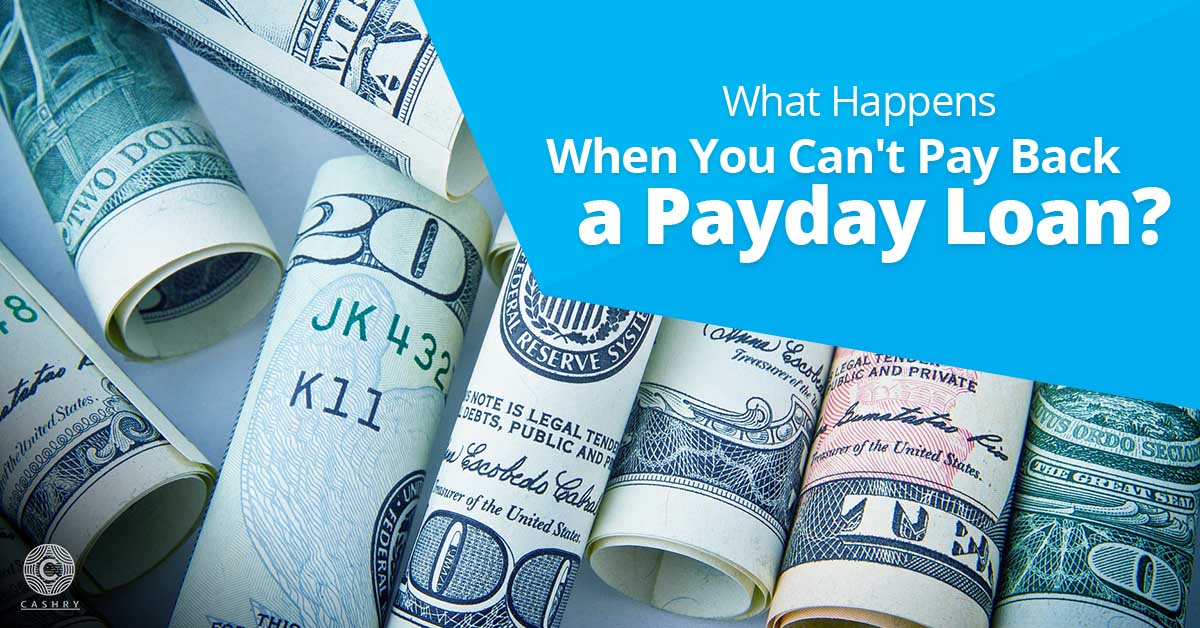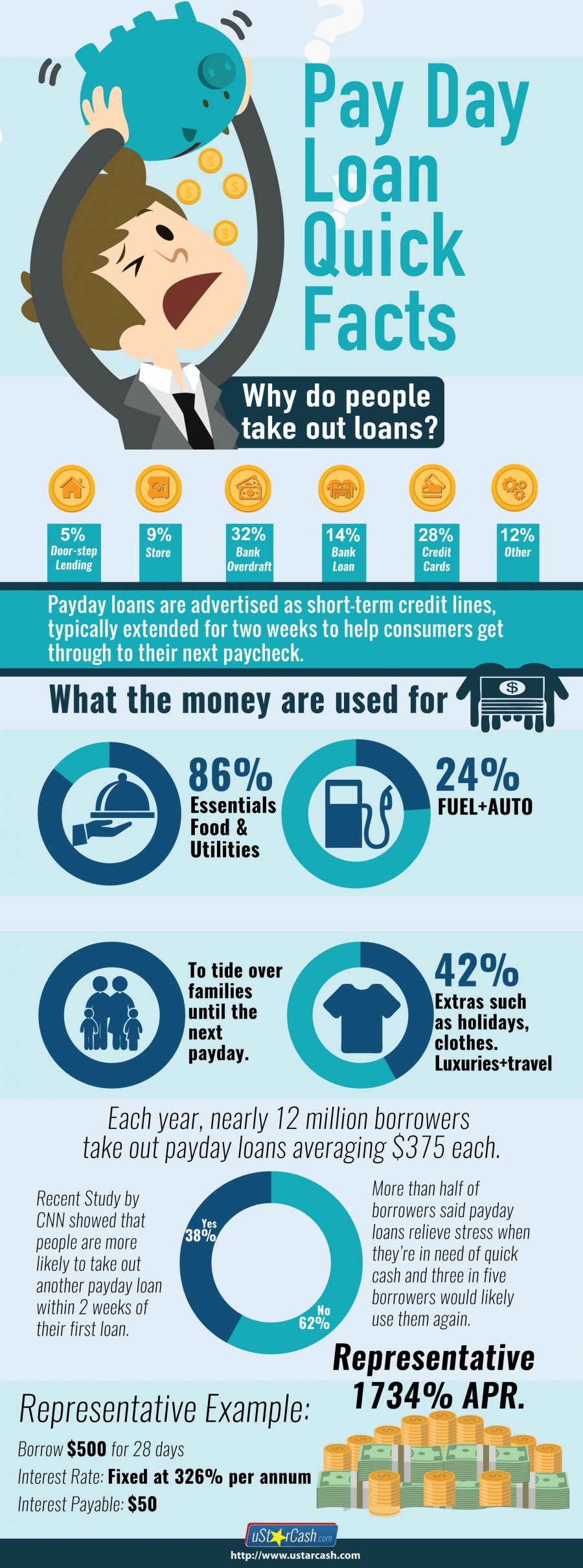What Happens When You Can’t Pay Back a Payday Loan?

Payday loans are often needed when you are in a bind and you need cash fast for a short amount of time. These types of loans are intended to be short term and get you into trouble when can’t pay back a Payday loan. Short term typically is a couple of weeks. The purpose is for them to get you until your next payday, hence the name. The application is quick and it involves verifying income, so lenders see you can repay the money. They ensure that you have a checking account. The lender deposits the money directly into that bank account.
Then you must write a post dated check for the loan amount plus interest. The intent of the post dated check is to guarantee your repayment of the loan on the payment date. Payday loans do not verify your credit.
They verify that your check is automatically deposited into the account from which you have just written a post dated check. The date of the check is the date on which you are paid. Hence, the name payday loans. It sounds simple enough, right? Sure, as long as you have the money to pay back the loan on the agreed upon date. What happens if you can’t pay back a payday loan?
Here’s What to Expect When You Default On a PayDay Loan
When you default on your loan it means you can’t pay back a payday loan on time. This may cause of series of events that can quickly spiral out of control. You want to do everything you can to avoid defaulting. In the event it happens, listed below are some things that could occur as a result.
1. Bank Withdrawals
Be aware, payday lenders want their money when it is due to them and won’t hesitate to take action to get that money. They have your bank account information. They will make a withdrawal from that account. You gave them access to your account as part of the agreement you signed. When they attempt to debit your account, it may not go through. The lender then tries to get a smaller amount of money. Every time a lender tries to get money from your account and it fails, may cause a fee for you. If the lender is able to get the money from your account, your account may go negative. Other debits may bounce and incur more fees.
2. Collection Calls
Lenders call you first and if they can’t get in touch with you, they call your references. They call anyone they can to find you. Debt collectors are only allowed to request help in finding you. They are not allowed to disclose any information about your or your debts. You should not ignore debt collectors. They will not stop trying to connect with you and your debt is still there.
You do have rights that you should know. You should receive, in writing, a notice of you much money you owe and to whom. If you disagree with the amount, you have the right to ask for proof of the debts. You must request that within 30 days of first contact from the debt collector. If they are not able to verify the debt within 30 days, they cannot collect on the debt. You have a right to dispute the debt.
If the debt is accurate, you can ask about repayment options. You can set up a payment plan. If you set up a payment plan, you must pay the debt. Be sure to keep records of all payments you make. Keep all emails, letters, and voicemail communication with the collector. You want to protect yourself. If you have incurred any fees, you may be able to get them waived.
3. Asking Your Lender for New Terms
If you can’t pay back a payday loan with your original agreement, you can ask for an extension on your payment plan. You must do so before the last day your loan is due. The lender will ask you to sign an amendment for your existing loan agreement. Be sure to read it. It contains the terms and interest rates to which you agreed. You may be able to get a few more weeks, but make sure you understand the cost.
The lender often tries to work with you it is simpler to get the money from you, instead of going through a collection agency. A collection agency pays the lender for your debt; the pay only pennies to the dollar.
If you have to deal with collectors, you can start with 50% of the amount you owe. When you make an agreement, get it in writing and verify it states that this agreement settles your debt. If you are not able to make a settlement, debt collectors are serious about getting their money. They may show up at your place of employment, call you constantly, threaten a lawsuit, or report you to the credit bureaus.
4. Lender Takes You to Court
If you and the collectors are not able to come to an agreement, they may take you to court. Do not think the amount you owe is too small for them to sue you. Most importantly, if you are sued, do not ignore it. The lender automatically wins if you don’t know go to court. One the judge makes a judgment, the court begins collecting the money you owe. That means they may garnish wages, levy your bank account, or put a lien against your property.
Can They Garnish Your Wages for a Payday Loan?
According to Consumer Financial Protection Bureau, if you can’t pay back a payday loan, a payday loan lender can garnish your wages if they have a court order as a result of a lawsuit. If you do not pay back your loan, the lender or another debt collector may sue you to collect what you owe. If you lose the lawsuit, or don’t dispute the lawsuit, the court enters a judgment against you. The judgment states the amount you owe, then the lender can garnish your wages.
During wage garnishment, your employer holds a portion of your paycheck to pay your debt. There is a law stating what percentage of your earnings the lender can take to pay your debt. During a bank garnishment, your bank has the garnishment order. The bank takes a certain amount from your bank account to pay your dents. Similar to wage garnishment, there is a legal limit on how much the bank holds. Each state has their own limits, so make sure you check the amount your state allows.
If the payday lender threatens garnishment be sure they have an actual court order. Sometimes, the lender says they have a court order when they do not. In instances like this, you should get legal advice. Most importantly, do not ignore a summons. By appearing in court, you have the chance to fight any garnishment.
Can You Go to Jail for Not Paying Back a Payday Loan?
According to Erin B. Shank, attorney at Central Texas Bankruptcy, no, you can’t go to jail when you can’t pay back a payday loan. The U.S. Constitution states makes it illegal to for you to go to jail for your debt. There are federal bankruptcy laws allowing people to file bankruptcy protection when they can’t pay their debts. Debt collection is not a criminal matter. It is left to the civil court system. It is illegal for lenders to threaten to arrest you. If they do threaten to arrest you, you should contact your state attorney general’s office.
How to Get out of Paying A Payday Loan – Get Rid of the Debt Step
1. Stop Borrowing Anymore
If you already can’t pay back a payday loan, do every things possible to avoid payday loans with low income. Many people get stuck in a cycle of extending their current payday loan by adding on to it. This only perpetuates the cycle of high interest on top of money you already owe. There are other options for you to seek instead of getting another payday loan.
2. Pay the Max you Can
If you can’t pay back a payday loan in full, make arrangements to pay as much as you can. The lender may extend your payback date for another week to give you more time. Attempt this option before seeking another payday loan.
3. Don’t Seek Payday Loans Again Even With Low Income
When you are in a position where you can’t pay back a payday loan, try to avoid another payday loan. If you are in a low income situation, payday loans are still not the answer. Cashry offers advice on ways to avoid additional payday loans.
You could try to sell items around your house that you don’t need. Online auction sites like eBay and local sites are great places to sell unwanted items. You could attempt to find a second job to help pay off debt. If you have fairly good credit, you could apply for a bank loan. You could borrow from an IRA or 401k. Trying any of these options would be a better alternative to a payday loan.
You may find help by asking friends and family to borrow money. It is never easy to ask people if you can borrow money. Loanry provides advice on how to ask for help. The article even gives advice on writing a contract for borrowing. Personal loan lenders might be able to give you a better interest rate on a loan. There are many faith-based organizations that can offer assistance, especially with food. If you are in the military, there may be federal programs that can provide relief.

Do I Have Options if I Default on My Payday Loan?
1. You Qualify for Free Money Programs
When you can’t pay back a payday loan, you may be in a situation where you need more help. You may qualify for programs when you need help you paying rent. There are programs that help you pay your utility bills. There are federal programs that help pay medical bills. Other programs that help pay for food. The key is for you to know that there are programs available and how to find them. Cashry provides a list of services for which you may qualify when you need help paying the bills
2. Seek Credit Counseling or Legal Aid
If you find yourself under a mountain of debt and you can’t pay back a payday loan, credit counseling is for you. A counselor helps you plan to pay your debt. A counselor also helps you understand healthy spending habits.
3. Speak with your Lender to determine other repayment options
Cashry offers sound advice on how to work with the lender. Work with the lender to put together a repayment plan you can afford. Lenders prefer to work with you over selling your debt to a collector. Find a good lender when you’re getting a loan in the first place, and you’ll be able to communicate all your difficulties to them and make sure both sides come out as winners.
Conclusion
Payday loans aren’t always the best route. You can easily get into a position where you can’t pay back a payday loan. If you do need a payday loan, be sure you understand the terms. Be sure that you can pay back the loan on time. Be sure that the high interest rate is worth the few weeks you have to pay back the money. If you can accept these terms and pay back the money timely, payday loans may work for you.


Julia Peoples is a long-time business manager focused on providing decision making assistance to the public. She works with people at key points of their lives who are making important retirement and financial decisions. She has had many articles published that educate the public on sound financial decision making.
Julia writes for those who are working towards financial freedom or a better understanding of how finances work. She has shared her financial insights with individuals on a one on one basis for years.

